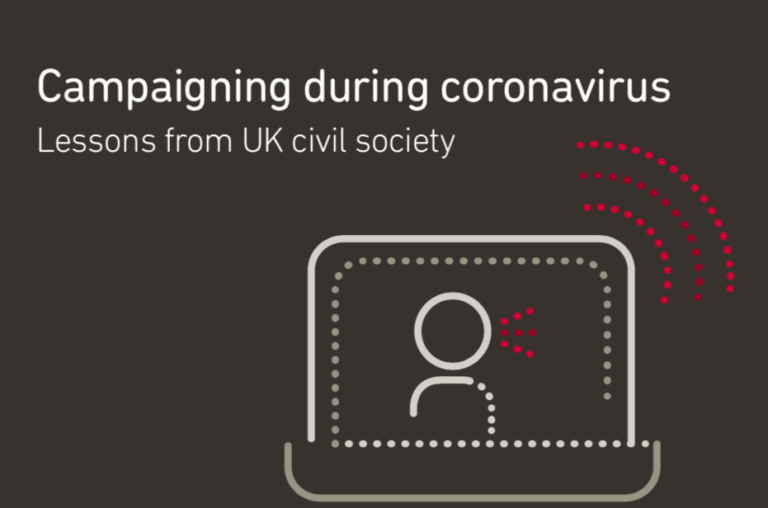Report warns of increasingly restrictive environment for campaigners & civil society

Campaigners who made vital contributions to the initial UK Covid-19 response struggled to engage with the government in the later months of the pandemic, with new restrictions about to make it harder, a new report has found.
Campaigning during coronavirus: Lessons from UK civil society by Bond, Quakers in Britain, ACEVO, NCVO and Unlock Democracy, with the Civil Society Voice (CSV) network, found that plans to place new restrictions on the right to protest and stricter limits on access to judicial review will make it harder for campaigners to voice concerns and hold the government to account.
It reveals that during the initial weeks of the pandemic, campaigners were able to cut through and significantly influence government policy by building cross-party consensus, moving campaigning tactics online, and engaging with the public to highlight people’s stories of job losses or homelessness.
Advertisement
Examples include the campaign for furlough, which led to the creation of the Coronavirus Job Retention Scheme, and campaigning that sought to highlight the difficulties faced by private renters, which resulted in tens of thousands of people being protected from eviction.
Report co-author Rowan Popplewell, Civic Space Policy Manager at Bond, said:
“From protecting millions of jobs in the UK to advocating for fairer access to vaccines globally, campaigners have ensured a more compassionate, inclusive and effective pandemic response. The pandemic revealed the power and benefit of campaigning. The political environment, as well as restrictive legal and regulations, continues to create barriers for campaigners seeking to deliver change for the people and issues they care about. As we enter the second year of the pandemic, we need to reset the relationship between campaigners and decision-makers and take steps to better protect the right to campaign.”
Commenting on their experiences, and also calling for action, Lucy Bannister, Policy Campaigns Manager at Joseph Rowntree Foundation said:
“The pandemic has had a huge impact on families in poverty and has posed many new challenges for our campaigning. However, by embracing digital technology and new ways of working we have been able to bring together huge numbers of organisations across the campaigning sector to collaborate quickly on shared priorities.
“Our campaign against the upcoming £20 cut to Universal Credit shows how invaluable cross-sector collaboration is, as well as how important it is to have a consistent, well-framed narrative to secure political and media cut-through. The past year has exposed and exacerbated existing inequalities and has demonstrated that governments can take bold action to protect people on low incomes from harm. As we emerge from this pandemic, the sector will have a key role in shining a spotlight on longstanding injustices. We now need to work together to raise the ambitions of the public and politicians so we can shape a future where everyone has the opportunity to thrive.”
The report calls for the government to create a new framework that better protects the right to campaign, based on a number of key principles, which are:
- Campaigning is a crucial part of promoting and protecting open societies, democracy, transparency and human rights. The rights to freedom of assembly and association and to freedom of expression and information are protected by the International Covenant of Civil and Political Rights and other national and international instruments.
- Campaigning is a legitimate and necessary activity for civil society, including registered charities and organisations that receive public funds. It tackles the root causes of problems and delivers social change. All people and organisations have a right to campaign.
- Campaigning seeks to challenge injustices, hold the powerful to account and deliver social change. In this way, campaigning is political but campaigning by registered charities and non-partisan civil society organisations is never party political.
- Campaigning is carried out by a range of different people and groups, using a variety of tools and tactics to make change happen. Campaigners should be able to choose the most appropriate and effective means, including protest – a right enshrined in international law.
- Campaigning requires a supportive and enabling legal, regulatory and political environment. Democratic values, processes and institutions are the foundation of an enabling environment, fostering debate and conducive to a vibrant civil society.



